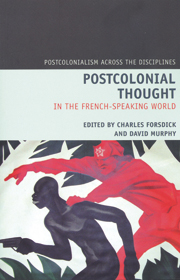Book contents
- Frontmatter
- Contents
- Acknowledgements
- Introduction: Situating Francophone Postcolonial Thought
- Section 1 Twelve Key Thinkers
- Section 2 Themes, Approaches, Theories
- 13 Postcolonial Anthropology in the French-speaking World
- 14 French Theory and the Exotic
- 15 The End of the Ancien Régime French Empire
- 16 The End of the Republican Empire (1918–62)
- 17 Postcolonialism and Deconstruction: The Francophone Connection
- 18 Negritude, Présence Africaine, Race
- 19 Francophone Island Cultures: Comparing Discourses of Identity in ‘Is-land’ Literatures
- 20 Locating Quebec on the Postcolonial Map
- 21 Diversity and Difference in Postcolonial France
- 22 Colonialism, Postcolonialism and the Cultures of Commemoration
- 23 Gender and Empire in the World of Film
- 24 From Colonial to Postcolonial: Reflections on the Colonial Debate in France
- Notes on Contributors
- Bibliography
- Index
14 - French Theory and the Exotic
from Section 2 - Themes, Approaches, Theories
- Frontmatter
- Contents
- Acknowledgements
- Introduction: Situating Francophone Postcolonial Thought
- Section 1 Twelve Key Thinkers
- Section 2 Themes, Approaches, Theories
- 13 Postcolonial Anthropology in the French-speaking World
- 14 French Theory and the Exotic
- 15 The End of the Ancien Régime French Empire
- 16 The End of the Republican Empire (1918–62)
- 17 Postcolonialism and Deconstruction: The Francophone Connection
- 18 Negritude, Présence Africaine, Race
- 19 Francophone Island Cultures: Comparing Discourses of Identity in ‘Is-land’ Literatures
- 20 Locating Quebec on the Postcolonial Map
- 21 Diversity and Difference in Postcolonial France
- 22 Colonialism, Postcolonialism and the Cultures of Commemoration
- 23 Gender and Empire in the World of Film
- 24 From Colonial to Postcolonial: Reflections on the Colonial Debate in France
- Notes on Contributors
- Bibliography
- Index
Summary
From the sixteenth century, the French adjective exotique was used to refer to the natural or cultural product of another country, but the term rapidly became marked by its current Eurocentrism, losing any reversibility. It was a virtual synonym of ‘colonial’ by the nineteenth century, when the noun exotisme appeared (1845). The newly reified concept had acquired connotations of hackneyed imagery and falsity in the representation of the Other (Moura, 1998: 19–40). This pejorative sense was not to be seriously challenged until the early years of the twentieth century, by Victor Segalen (1878–1919), who attempted to revalorize the concept in his notes towards an Essay on Exoticism. Since the term was so compromised, much of this project involved sweeping away the accumulated literary banalities of preceding generations. He went on to redefine exoticism as ‘[…] nothing other than the notion of difference, the perception of Diversity, the knowledge that something is other than one's self; and Exoticism's power is nothing other than the ability to conceive otherwise’ (2002 [1978]: 19). He saw exoticism not as a fixed state but as a tension between two poles, emphasizing, for example, ‘exoticism to the second degree’ (15), or the effect of the subject (e.g. traveller or colonist) on the Other; he also situated the exotic in an oscillation between the realms of the real and the imaginary, the real being direct experience of the Other and the imaginary being the construction of that Other through reading, daydreaming and, in some cases, stereotyping.
- Type
- Chapter
- Information
- Postcolonial Thought in the French Speaking World , pp. 185 - 194Publisher: Liverpool University PressPrint publication year: 2009



